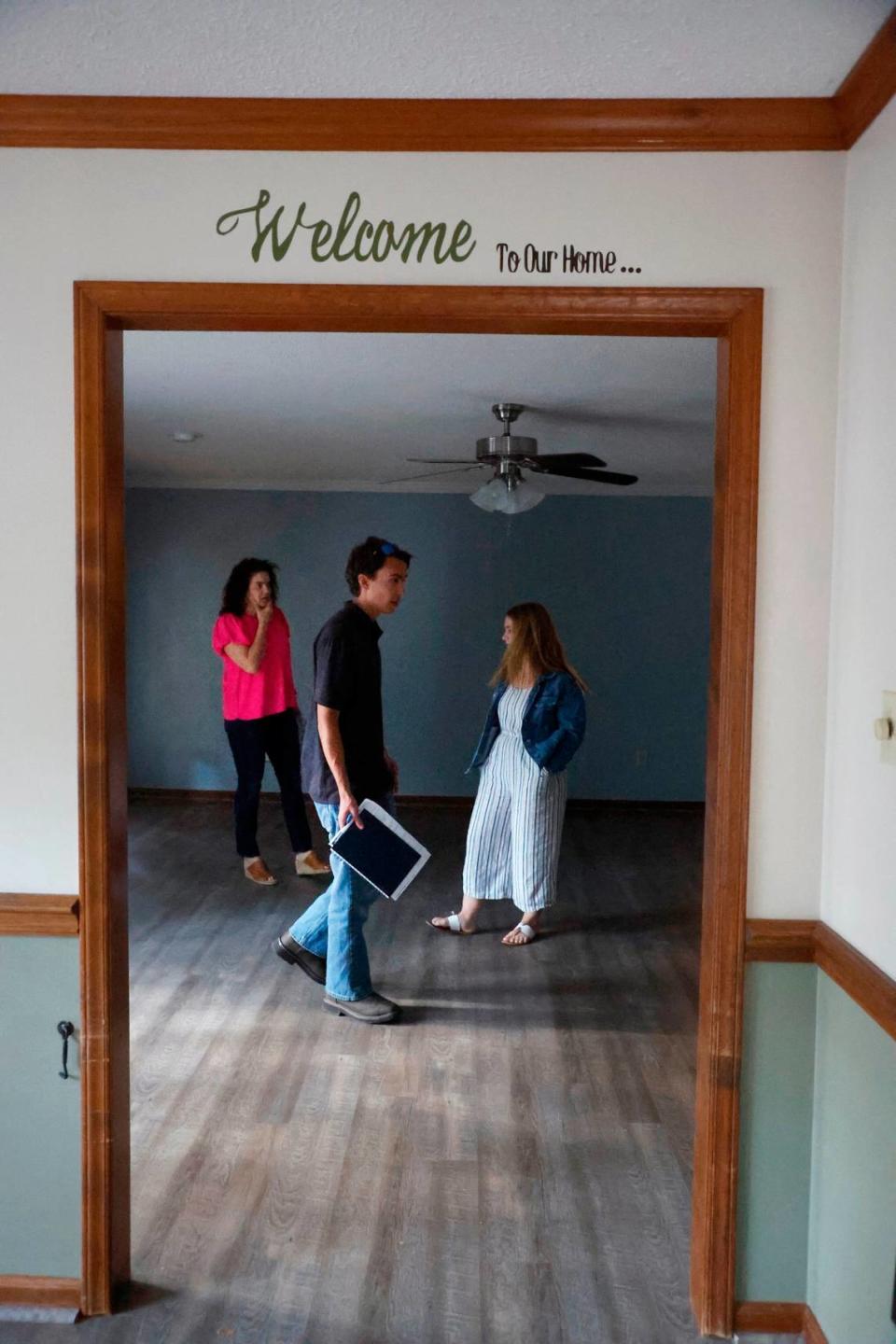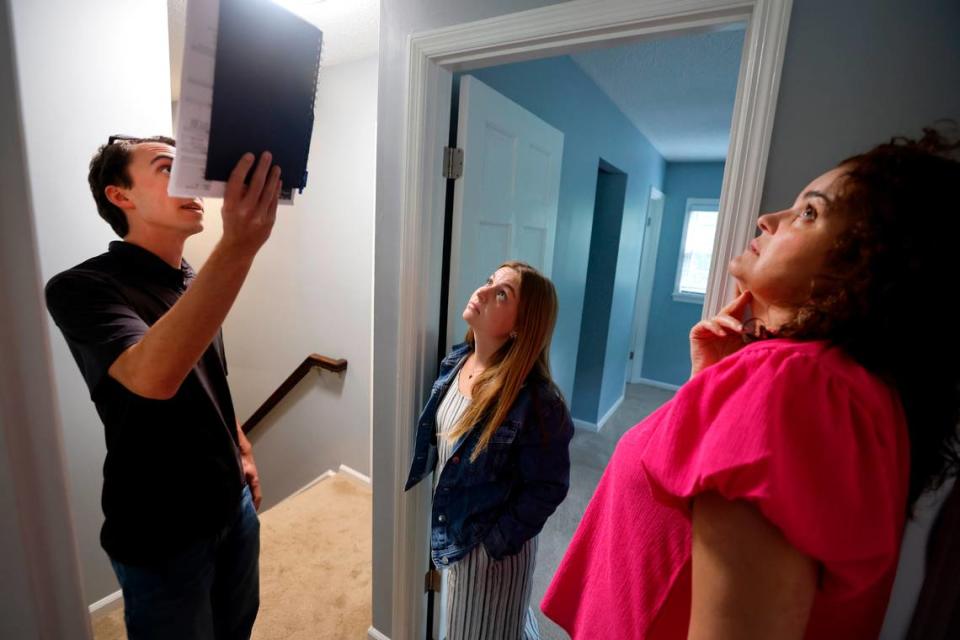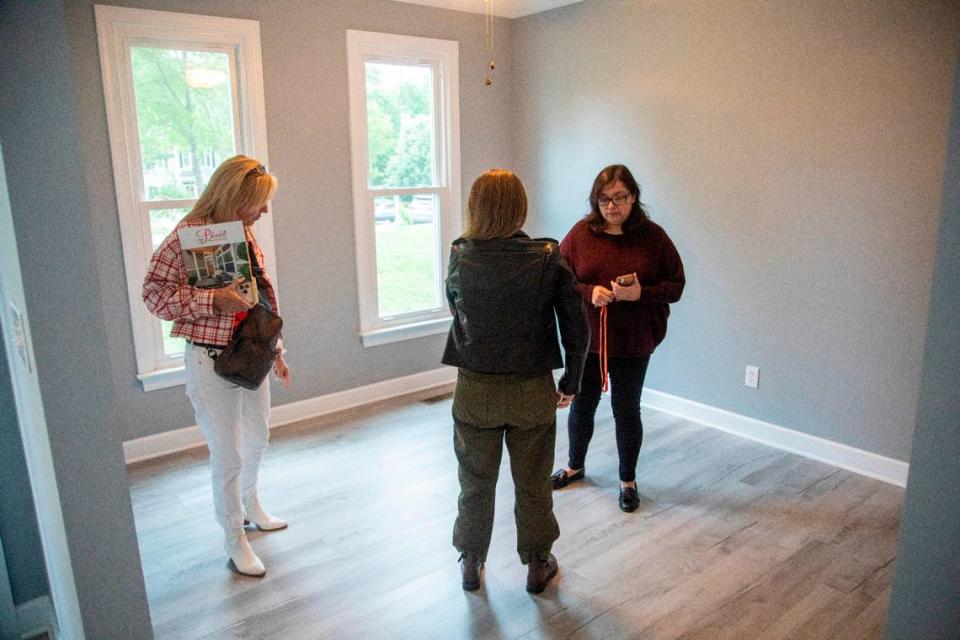‘Nothing under $300K’: First-time buyers priced out of starter homes in the Triangle
On a blue-sky day in early May, Brandon Thomas and his fiancee, Corinne Enlow, started house hunting in the Triangle.
Both 23 and fresh out of college, they’re not the typical first-time buyers. Most Gen Z, or Zoomers (ages 18-26), are just coming of age and establishing themselves on the job market. Only 29% currently own homes in the Raleigh-Cary market, a recent study found.
This couple wants to be ahead of the curve.
Ever since they met on a cruise ship at 16, Thomas, originally from Greensboro, says he’s been saving for a down payment on a starter home, driving tractors at horse shows and running his own eBay store on the side.
This month, he graduated from N.C. State with a degree in mechanical engineering. He’s already lined up a job at John Deere’s manufacturing plant in Fuquay-Varina starting this June. Entry-level salaries for product engineers at the firm usually start at around $84,000 a year. Enlow can expect to make $40,000 as an entry-level teacher. Without help from their parents, they’re preapproved for a loan up to $410,000 with the John Deere Credit Union. They’re hoping to find a three-bedroom house in move-in condition.
“With interest rates, you can always refinance. The main thing is the price of the home,” Thomas said. “I don’t want to pay double what the house really should be worth.”
This spring, Thomas and Enlow join a growing legion of first-time homebuyers wading back into the Triangle housing market after two-plus years of sky-high house prices. But while Wake County home sales are slowly cooling, they’re quickly discovering there are few options, and they face stiff competition.
“There’s absolutely nothing, especially if you go under $300,000. If there’s a decent deal, it’s gone the same day. Or it needs something major,” Thomas said.

On this day, they toured three houses: The first, in Garner, reeked of dry rot; the second, in Clayton, came with a septic tank buried under a few feet of concrete and no access point; the third, also in Clayton, hadn’t been updated in over 20 years.
In the end, no offers. “It hurts knowing that prices have gone up,” Thomas said, shaking his head. “Five years ago, this house would have sold for $150,000. Now they want $325,000. It’s a good deal in this market, but it still sucks.”
Four days later, they put an offer on a house in Holly Springs. It was $46,000 over asking price, and $15,000 in due diligence. It got rejected. They’re already having second thoughts about becoming homeowners.
“It’s starting to be a not-very-clear decision to buy,” Thomas said a few weeks after looking at the houses. “I’m certainly a little bit more up in the air about it.”

A new normal
Home values across the Triangle jumped by 22.2% between June 2021 and June 2022, when they hit a peak median price of $430,000. As North Carolina remains one of the fastest-growing states, bidding wars became commonplace, real estate agents say, sidelining most first-time buyers who couldn’t compete with over-asking-price bids, all-cash offers, and high due-diligence fees. Then mortgage rates doubled within a matter of months last spring, cooling down the market but further locking out would-be buyers.
Across the U.S., the share of first-time homebuyers dropped to a record low, according to the National Association of Realtors (NAR). First-time buyers made up 26% of all buyers in 2022, down from 34% the previous year, the group found. Many also took longer to put together enough cash for a down payment. The typical American buyer was 36 years old, an all-time high.
“When the interest rates went up, everybody just froze. No one knew what to do,” said Cory Sherman, a broker with Homegrown Real Estate in Durham. But first-time buyers are starting to come back, he said. “It’s kind of like the shock has worn off a little bit. We’re in a new normal.”
Inventory remains on the rise — up 51.2% year-over-year in April — and new-home sales are up 13% in Wake County, compared to a drop overall by 21%, according to the latest data from Triangle MLS (TMLS), a Cary-based real estate listings platform. Homes are also staying on the market for longer. In March, it was 21 days, up from 9 last year.
That’s good news for buyers. With more homes on the market and less competition, many feel they’ve got more bargaining power. All-cash offers still happen, analysts say, but sellers are increasingly paying for closing costs to seal the deal. Some are also offering mortgage buydowns that give a borrower a lower interest rate for at least the first few years of the mortgage.
“Since August, we’ve been doing that, and it’s opened up a lot of doors for first-time homebuyers,” said Colleen Blondell, owner of Blondell Properties and a board member of the Raleigh Regional Association of Realtors. “I’m just seeing a huge opportunity.”
But it also depends on where you’re looking. Conditions are still tight, especially in hot markets like Cary, Apex, and North Hills and certain pockets of Durham and Wake Forest.
“We’ve got so many submarkets here,” said Stacey Anfindsen, an Apex appraiser who analyzes MLS data. “We still have multiple offers in certain submarkets and houses selling above list price, but it’s nowhere near the percentages they were in the first and second quarter of last year.”

The market is certainly more favorable, said Tammie Harris, managing broker at Tammie Harris Real Estate Firm in North Raleigh, but buyers still must be open and flexible, even a little scrappy, to find success.
“They’re having to get creative — from townhomes to modular homes to double-wide mobile homes that are brick underpin, to some older communities where they’re having to fix up homes.”
They’re also having to expand their search, she said. Priced out of the inner suburbs, many are looking into smaller, outlying towns like Clayton, Wendell, Zebulon and Franklinton to find deals at their price point.
“It’s still happening, but it’s further out. You can’t do that in North Raleigh or North Hills.”
Still a seller’s market
While sale prices may be flattening both in the Triangle and nationally, they remain high. The Triangle’s median sale price stood at $415,000 in April, TMLS reported. That’s 7.2% more month-over-month, but down 2.4% year-over-year, aligning closer to historic trends.
Lawrence Yun, NAR’s chief economist, said recent price declines are temporary. He expects new and existing-home sales to bottom out in 2023 “before an upturn in 2024.”
Yet even without a price bump this spring, it’s still a lot more expensive to buy a house today in the Triangle than it was a few years ago. Interest rates are well above 6%. In late May they were 6.35%, up from 5.3% a year earlier, according to Freddie Mac.
For many first-time buyers, “it’s just a real shell shock,” said George Linney, a loan officer with CIMG Residential Mortgage in Raleigh.
Take a median-price home today, with a 20% down payment on a 30-year loan. That house will cost you approximately $868 more a month to own than if you’d bought it in March 2019, when the median price was $269,900 and interest rates were 4.06%. Then, your monthly payments would have been about $1,038, including principal and interest. Today, the payment would be around $1,900.
Even if mortgage rates fall closer to 6% by the year’s end, Linney said, buyers shouldn’t expect to see them back to the 3% rates that triggered the housing rush over the pandemic. “I don’t see that happening. That was a bit of a COVID anomaly.”
And while inventory is edging up slowly and the market is starting to normalize, the Triangle is still facing a serious under-supply of housing, said Matt Fowler, executive director of TMLS.
At the end of April, the Triangle had a 1.5-months’ supply of homes to buy and in Wake County, only a 1.2-months’ supply. In a healthy housing market, it’s more like a four- or five-months’ supply. In particular, houses priced under $345,000 — what he considers a “starter home” in the Triangle — are scarce.
Recent adjustments to mortgage processing fees may improve conditions, he said, but it’s still challenging. With a persistent under-supply of housing, especially affordable housing, he doesn’t expect prices to budge much.
“With median prices in the high $300,000s in most areas, there are few choices,” Fowler said. “Rates also make it hard to qualify.”
Better to rent?
For many would-be homebuyers, the conditions are keeping them in the rental market.
Stacie, a teacher, and Jonathan Overby, a cook, work at First Presbyterian Day Care in Durham. For five years, they’ve been renting a double-wide manufactured home in Henderson for $900, commuting about 80 miles, round-trip, each day. They’ve been conditionally approved for a home around $250,000, but are struggling to find anything at their price point. This month, they abandoned their search when conditions deteriorated at their rental, forcing them to look for emergency housing instead.
“I’m beating myself up, Stacie, 50, said. “I feel like if I had done it earlier, then (homeownership) would be a lot easier.” Jonathan, 43, added: “It’s almost like there’s no hope.”
Rising rents are compounding the problem, said Derrick Thornton, a Realtor with Coldwell Banker Advantage out of Northeast Raleigh. Many are ending up in the rent trap — unable to save enough for a down payment because they’re paying too much of their income on rent.
“Black or Hispanic households are likely to be hit the hardest,” he said. “Income for these households has not risen anywhere near the rate of home values. To qualify for the median household price point simply isn’t high enough.”
The region’s millennials are also renting for longer. Even with a 73% surge in homeownership in the last five years, reaching a peak of 101,230 millennial owners, just 45% of the people in this age group are now living in their own homes, bucking the national trend as a renter-majority generation..
Another possible reason for so many renters? The growing popularity of the “renter-by-choice” lifestyle. In Raleigh, the number of “rich” renter households — those with annual incomes over $150,000 — skyrocketed by 178% between 2015 and 2020, going from 1,877 to 5,224, a RentCafe study reported.
“Homeownership is not a priority for everyone, especially not for millennials and Gen Zs,” said the study’s author, Andrea Neculae.
Closing the deal
That wasn’t the case for Carolina Acuipil and Carolina Rancano. Originally from Buenos Aires, the married couple with a 4-year-old daughter moved to the Triangle about a year ago for work. Both are physicians in their early 40s. They’ve been renting a four-bedroom home near downtown Cary for $2,900 a month but they’d rather own, so they entered the market this month. They’re looking in Cary because of the schools.

After they were outbid on a few houses, a four-bedroom, three-bathroom transitional in a subdivision came on the market in Cary this month listed for just under $600,000. They jumped on it, even though it didn’t have everything they wanted, like natural hardwood floors, offering just 1% over asking price. Their offer was accepted.

Coming from Argentina, where inflation is hovering at a staggering 97%, it’s a good deal. “Most young professionals cannot afford to buy a home (there). It’s not an option,” Acuipil said. “For us, the experience has been great.”

